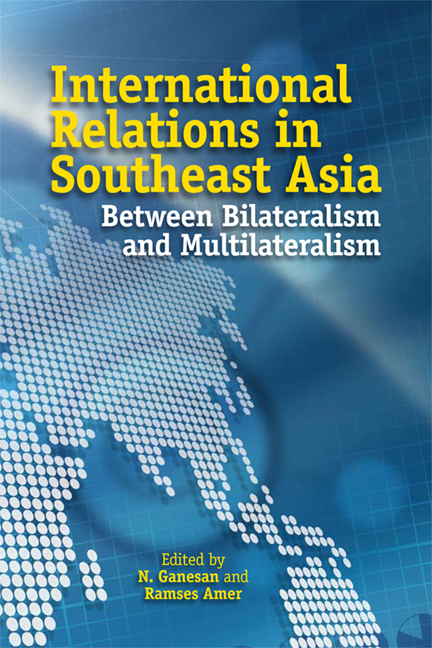Book contents
- Frontmatter
- Contents
- Preface
- List of Abbreviations
- Contributors
- Introduction
- Part I On International Relations
- Part II Case Studies — Mainland Southeast Asia
- Part III Case Studies — Maritime Southeast Asia
- 7 Malaysia-Indonesia Bilateral Relations: Sibling Rivals in a Fraught Family
- 8 Indonesia-Singapore Relations
- 9 Bilateralism and Multilateralism in Malaysia-Philippines Relations
- 10 Malaysia-Singapore Relations: A Bilateral Relationship Defying ASEAN-style Multilateralist Approaches to Conflict Resolution
- 11 Bilateral Relations between Indonesia and the Philippines: Stable and Fully Cooperative
- Conclusion
- Index
7 - Malaysia-Indonesia Bilateral Relations: Sibling Rivals in a Fraught Family
from Part III - Case Studies — Maritime Southeast Asia
Published online by Cambridge University Press: 18 November 2017
- Frontmatter
- Contents
- Preface
- List of Abbreviations
- Contributors
- Introduction
- Part I On International Relations
- Part II Case Studies — Mainland Southeast Asia
- Part III Case Studies — Maritime Southeast Asia
- 7 Malaysia-Indonesia Bilateral Relations: Sibling Rivals in a Fraught Family
- 8 Indonesia-Singapore Relations
- 9 Bilateralism and Multilateralism in Malaysia-Philippines Relations
- 10 Malaysia-Singapore Relations: A Bilateral Relationship Defying ASEAN-style Multilateralist Approaches to Conflict Resolution
- 11 Bilateral Relations between Indonesia and the Philippines: Stable and Fully Cooperative
- Conclusion
- Index
Summary
However close in proximity, Malaysia and Indonesia have not always been the best of neighbours. Relations reached their nadir with Konfrontasi in the early 1960s, when Indonesia violently contested Malaya's merger with Singapore, Sabah, and Sarawak as a neo-imperialist, nefarious plot. But while Malaysia is less prone to pick fights with Indonesia than with long-since-ousted Singapore, tempers have flared before and since. The fact that overall, relations are amicable and symbiotic, though, puts less friendly moments in context. The two countries celebrated fifty years of diplomatic relations in 2006, and economic ties have never been closer. Between 2001 and 2005, bilateral trade doubled and Malaysian investments in Indonesia nearly quintupled, making Indonesia Malaysia's tenth largest trading partner and Malaysia, Indonesia's fourth largest investor. Moreover, around 1.2 million Indonesians work in Malaysia — more than in any other destination country. These workers represent a critical part of the labour force, comprising around seventy per cent of all foreign workers in Malaysia. Moreover, despite the occasional sabre-rattling (whether symbolic or substantive), the two states cooperate militarily, for instance through a joint border committee and framework for exchange of maritime security information, and with more joint exercises than with other ASEAN states. Indeed, the sheer depth and breadth of Malaysia-Indonesia ties — manifest not just in official statistics, but through a tangle of social, business, educational, and other connections — opens up a host of possible fault lines that have remained dormant. Any overblown grandstanding must thus be taken in stride. Overall, relations are good, yet the bilateral relationship is weakly-enough institutionalized that relatively small matters readily escalate into diplomatic crises. Moreover, the underlying flexibility and practicality of Malaysia and Indonesia's bilateral relationship has arguably discouraged greater recourse to multilateral institutions, despite the leading roles both play in ASEAN.
Ruhanas Harun links phases in Indonesia-Malaysia relations with major changes in Indonesia's regime: the launch of the New Order after 1966 brought a renewed sprit of brotherhood and close affinity after Konfrontasi, including ever-closer economic and security cooperation, then the fall of Suharto in 1998 brought a new focus on joint problemsolving.
- Type
- Chapter
- Information
- International Relations in Southeast AsiaBetween Bilateralism and Multilateralism, pp. 171 - 198Publisher: ISEAS–Yusof Ishak InstitutePrint publication year: 2010



